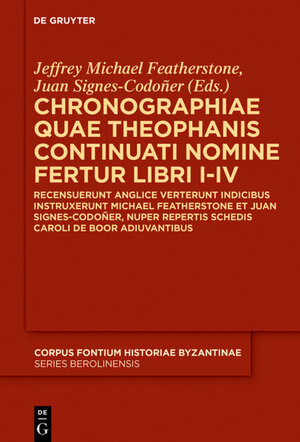
×
![Buchcover ISBN 9781614519591]()
„Diese Quisquilien mindern nicht den Wert des neuen Bandes in der renommierten Editionsreihe byzantinischer Quellentexte: Bei Theophanes Continuatus steht man nun auf sicheren Beinen!“
Michael Grünbart in: Bryn Mawr Classical Review 2016.12.40
Chronographiae quae Theophanis Continuati nomine fertur Libri I-IV
Recensuerunt anglice verterunt indicibus instruxerunt Michael Featherstone et Juan Signes-Codoñer, nuper repertis schedis Caroli de Boor adiuvantibus
herausgegeben von Jeffrey Michael Featherstone und Juan Signes-CodoñerTaking up where the the chronicle of the monk Theophanes leaves off , the compilation known as Theophanes Continuatus was originally commissioned by the emperor Constantine VII (912-959) and marked the revival, or reinvention, of the genre of history in Byzantium, which also included the less successful text of Genesios, who worked with the same dossier of sources. A principal source for the second period of Iconoclasm and the Amorian dynasty, the tendentious narrative of Books I-IV of Theophanes Continuatus was intended to justify the murderous accession of Basil I (867-886), grandfather of Constantine VII and founder of the Macedonian dynasty, by presenting the emperors who preceded Basil as cruel heretics (Leo V, Michael II, Theophilus) or profligates (Michael III). But the facts here recorded and the often playful use of Classical learning give proof to the careful reader that the revival of Byzantine military power and culture from the Dark Age of the seventh and eighth centuries gained momentum under these same emperors. The present critical edition of Books I-IV replaces that of 1838 by I. Bekker. Accompanied by the first complete English translation and grammatical and historical indexes, the work is intended for specialists, students, and scholars in related fields.




